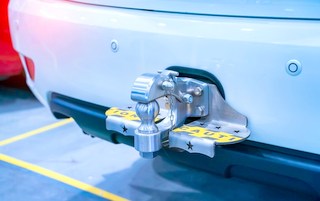How Do Trailers Affect EV Range?
Electric Pickups Can Haul Easily, But at a Cost
This article may contain affiliate links.
As electric pickup trucks become more popular, it’s natural to wonder how adding a trailer will its range. Many people must move and haul loads long distances and may be concerned about limitations.
Here’s what to know.
Which EVs Can Tow?

It’s vital to know which EVs can tow before adding an attachment. According to Kelly Blue Book, the following popular vehicles can easily pull a trailer: Published towing capabilities are:
- GMC Hummer EV: 7,500 pounds
- Rivian R1T: 11,000 pounds
- Ford F-150 Lightning: 10,000 pounds
- Chevrolet Silverado EV: 10,000 pounds
Some vehicles have extended-range options that carry higher weights than the standard model for a higher price.
The payload for these vehicles is a great start, but what will the range impact be?
How Trailers Affect Range
Your vehicle’s range is how far it can go on a gas tank or battery charge. EVs generally don’t have as long of a range as gas-powered vehicles, although they’re improving. Their distances are impacted by various things that don’t affect other vehicles.

For instance, going uphill strains the battery and extreme temperatures can increase the EV’s energy use, reducing range.
Adding a trailer to an electric vehicle can greatly reduce its range. Rivian says a heavy trailer can reduce its R1T pickup’s range in half, going from 314 miles to 157 miles. Other research shows that some EVs can fare much worse.
Research by Motor Trend shows that the Ford F-150 Lightning can usually go 300 miles before a charge, but this is reduced to 115 miles with a 3,140-pound trailer. When towing a 5,260-pound camper, it dropped to 100 miles.
Caring for a Trailer Used With an EV
Properly caring for your trailer will make towing it much easier. Regularly check your tires and lubricate wheel bearings. Ensure you rinse dirt and saltwater off after a trip to avoid metal damage and treat rust early to keep your trailer intact.
Security is also important with your trailer. Investing in a heavy-duty trailer lock is one of the simplest ways to prevent theft and protect your equipment, whether you own a small utility trailer or a large travel rig.

The Future of EV Towing
Electric vehicles may handle payloads better in the future, improving their range.
In the meantime, hybrid vehicles do better with towing range, as the gas tank can compensate for the battery’s shortcomings. If you regularly haul heavy loads over large distances, it might be best to avoid an EV purchase until the range improves or only take trips with fast-charging EV stations along the route.
However, it may still be a worthy investment if you rarely tow things.
Know Your Limits
Understanding your vehicle’s range is vital to plan your trips accordingly. You don’t want to end up stranded with no charging station in sight. Doing your research, regardless of the vehicle, can help you know what your EV is capable of before hitting the road.

Regardless of the motive power source, all soft-wheeled vehicles exhibit the trend of lower MPG (or Distance/UnitEnerty) as vehicle weight increases – primarily due to energy lost due to tire flexing. With a trailer and/or increased payload, the combined vehicle weight and any change in aerodynamics of the vehicle comes into play. Electric vehicles may be able to limit the impact of added weight since they can recoup some braking energy with re-generation.
@Dennis,
Thank you for the added technical info. It’s always good to hear from an engineer. –ed.